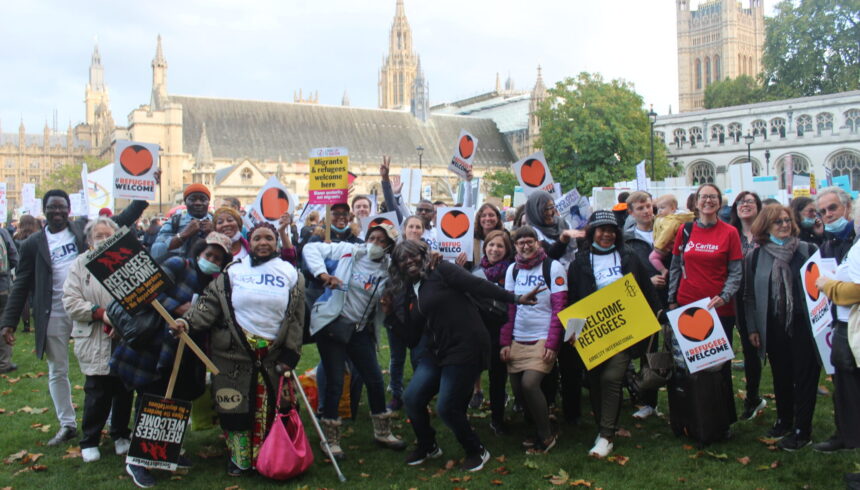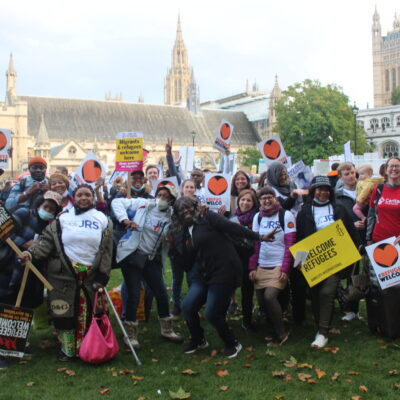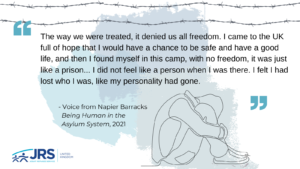In the first in a series of blogs written for The Tablet, our Senior Policy Officer, Dr Sophie Cartwright, introduces and explains the cruel impacts of the Nationality and Borders Bill.
The Nationality and Borders Bill currently going through parliament is a key part of the government’s much vaunted New Plan for Immigration. At its heart this plan, and the Bill, aim to make it as difficult as possible for refugees to get safe haven in the UK. It radically reduces the protection we offer to refugees. It works together with bits of government policy that don’t require changes in law. It operates on numerous levels, so that people seeking sanctuary will find doors slammed shut at every turn.
First:
it builds barriers to even getting an asylum claim heard. This is primarily through the ‘inadmissibility’ procedure under which, if a refugee travels via another country, the government will initially refuse to hear their claim for asylum, and try to get not just that country, but pretty much any other country to process someone’s claim.
Together with our friends at the St Vincent de Paul Society we’ve developed a resource to explain eight things you should know about the bill and four actions you can take to change it.
We have created two PDF documents you can easily view, download and and share:
Download the
Factsheet Download the
campaign toolkit
Second:
it makes asylum determination even harsher than it is already. This is done through a number of measures that will work together so it’s a little tricky to summarise. Crucially, the Bill would raise the threshold of proof required to demonstrate that one needs protection to a level that most people would struggle to meet. This happens alongside measures that obstruct access to legal justice in the asylum system. For example, the Bill creates a process for “accelerated” asylum appeals in detention. This would effectively resurrect the “detained fast-track” asylum process, in which people are held in detention whilst their asylum claims were rushed through, nearly always to refusal. The process didn’t give asylum claimants space to engage with the system or get adequate legal advice, and was so profoundly unfair it was ruled illegal. Returning to it will not improve the asylum system.
Third:
the Bill makes life in the asylum system even more difficult to endure. A key part of this is that it lays out provisions for more asylum “accommodation centres”. These are likely to be akin to the one at Napier barracks, which is being used to trial such centres – isolated, bleak, and prison-like. Already, asylum accommodation is very poor. This would be so much worse.
Finally (for this blog, anyway):
it strips away the protection and basic rights offered to most refugees recognised in the asylum process. It does this through a two-tiered system of refugee rights that penalises refugees for how they travel to the UK, and whether they claimed asylum at the earliest apparent opportunity. As I have noted before, this approach ignores the basic reality of forced migration. It also ignores the reality of our own asylum system, which does not contain a mechanism for travelling to claim asylum and has been widely criticised as a departure from the Refugee Convention itself, which does not oblige people to claim asylum in the first available safe country. In fact, the majority of refugees could end up considered second class under this new legislation.
This is a deeply cruel thing to do to people. Imagine being forced to leave your home, and making a treacherous journey to somewhere you hope is safe, and where you hope you can build a life. Rather than being greeted with welcome and protection, you must then navigate a hostile asylum system. Eventually, grudgingly, the government acknowledges you are a refugee. But it grants you only temporary leave. You are denied the opportunity to reunite with family that was torn from you, left at risk of destitution, and live with the threat of expulsion hanging over your head.
Across all the Bill’s layers on asylum is the determination to deny sanctuary to refugees if at all possible. The Bill also contains a section on modern slavery, which similarly makes it harder for survivors of modern slavery and trafficking to access support.
Some measures in the Bill build on the worst elements of the current UK asylum system: asylum determination is already warped by a culture of disbelief and refusal. This Bill further entrenches it, and formalises it. Life in the asylum system is already gruelling for many, as we at JRS UK know only too well from the refugees we accompany and serve. This Bill will make it much, much worse, and more widespread. Key aspects of the Bill are decisively new: The two-tier system for people recognised as refugees strips away what is left of our commitment to the basic principle of international protection.
Across both the old and the new, the Nationality and Borders Bill is a deeply troubling piece of legislation.
Read more about the government’s Nationality and Borders Bill, and New Plan for Immigration, and learn how you can take action Together with Refugees.
This is an edited version of a blog originally published in The Tablet on 10 November 2021.




